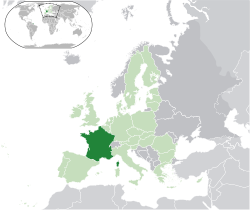France Readies EU Fiscal Pact For Ratification Amid Backbench Rebellion
By EurActiv
(EurActiv) — France’s Socialist-led government today (19 September) kickstarted ratification of a European Union budget discipline pact it grudgingly accepts as the next step out of the euro debt crisis. Meanwhile, another EU treaty for further political integration is already in the pipeline.
Created in March by President François Hollande’s predecessor Nicolas Sarkozy and 24 other EU leaders including Germany’s Angela Merkel, the fiscal compact requires eurozone countries to slash their public deficits or face legal action and possibly fines.
Its entry into cabinet on Wednesday paves the way to likely approval by French parliament in coming weeks, despite noisy dissent within Hollande’s left-leaning coalition and growing disenchantment with the European Union among a French public facing 13-year jobless highs and fearing worse to come.
“We don’t like this pact, it is a Sarkozy legacy. Merkel insisted on it because France has been breaking stability pact rules since 2003,” Elisabeth Guigou, head of parliament’s foreign affairs committee, said of existing EU budget rules.

“But you don’t have to love a pact to ratify it. It’s one part of a deal and just the first step,” Guigou, one of the senior Socialists tasked with rallying the coalition behind the accord, said.
Parliament vote in October
The pact is due to be submitted to the French parliament in early October. It should pass through easily if, as they have stated, some of the deputies in Sarkozy’s conservative UMP party vote for it.
It will be the latest small step towards resolving Europe’s sovereign debt crisis since Germany’s constitutional court this month allowed a permanent bail-out fund to go ahead and pro-European parties came out ahead in a Dutch election.
But the passage of the bill will carry a political cost for Hollande at home and does nothing to forestall a looming clash with EU paymaster Germany over the deeper measures Berlin believes are needed for euro’s longer-term survival.
Even if it does not change the outcome, a vote against the accord from some left-wingers and ecologists within Hollande’s coalition will be a political embarrassment just as surveys show a steady decline in public support for him since his election in May.
French public falling out of love with the European Union
To sweeten the pill – and to try to take the sting out of a series of street protests due against the pact – the government is putting it into parliament alongside the package of EU-wide growth measures he secured at his first EU summit last June.
Moreover France’s top court has also said the new budget rules do not require any change to the constitution, meaning Hollande in turn can skip a referendum on it which he would not be certain of winning.
“The public is falling out of love with the European Union,” French European Affairs Minister Bernard Cazeneuve conceded on Tuesday, a day after a survey showed that nearly two-thirds of French would now reject the 1992 Maastricht Treaty that led to the euro.
The EU budget pact enters into force either when 12 out of the 17 eurozone countries ratify it, or on January 1 next year. Half a dozen, including Germany, have already backed it.
New treaty in the pipeline
French concerns about the treaty’s ratification are heightened because a new round of EU institutional shake up is already around the corner.
At their June summit meeting, EU heads of state embarked on a further round of institutional shake up, with a new treaty being prepared for signature at the upcoming December summit.
European Commission President José Manuel Barroso has joined German Chancellor Angela Merkel in believing that the eurozone crisis could not be overcome without a treaty change to transfer national competences – such as budget discipline – to European institutions.
“Let’s not be afraid of the words: we will need to move towards a federation of nation states. This is what we need. This is our political horizon,” Barroso said in his annual State of the Union address last week.
However, French officials doubt they can sell plans to draw up a new treaty for closer European integration to a wary public.
“It would not be sensible to launch into talks on a new treaty before we have got out of the crisis. It will be possible when there is not this sense of a risk of the eurozone falling apart, when Greece and Italy are back on track,” said Guigou.
“The big issue right now is ensuring that Europe does not slip into recession.”
French Prime Minister Jean-Marc Ayrault met with Barroso on Tuesday (18 September) for his first visit to Brussels since he was appointed. The two men “finally had the opportunity to share their political views on the future of Europe after President Barroso’s State of the European Union address,” according to a statement issued after the meeting.
